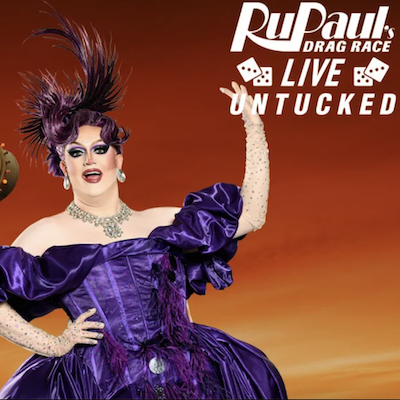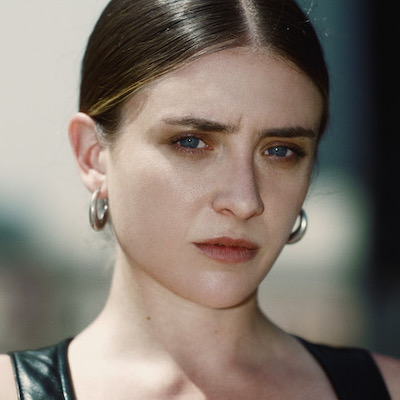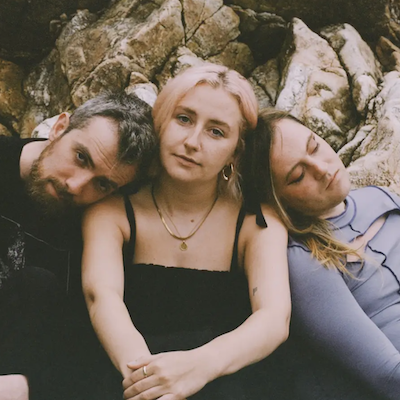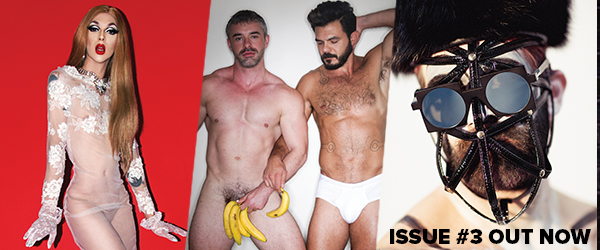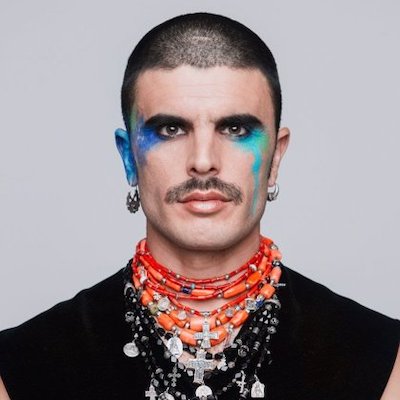
Taylor Swift may have made two award-winning albums last year, both dedicated to the art of folklore but could either of them really be considered sexy? The answer is clearly no. If you’re looking to put a bit more fun and frivolity in your folkore, (and let’s be honest, who isn’t?) then turn your eyes to Asturias in the north-west of Spain where you will meet Rodrigo Cuevas who is single-handedly making the idea of folklore frivolous and fabulous.
Loverboy attended one of his Trópico de Covadonga dates at Barcleona’s historic Palau De La Música Catalana earlier this year and after spending the last twelve months isolated, Rodrigo’s show was the perfect cure – bringing together people of all ages, genders, sexual persuasions and music fans for a night of passion and provocation.
Yesterday we caught up with Rodrigo to discuss how he loves to contrast old with new, how folklore can indeed be sexy and his two donkeys, Xuana and Faraona.
Hola Rodrigo, thanks for speaking with me! Where are you?
Hello! Ah right now I am in my car by the side of the Ria de Villaviciosa in Asturias. Right now it’s sunny but Asturias is famous for its rain! Haha. It’s also famous for its mountains, green coastline, its cider, oh and it has its own version of the bagpipes, the gaita asturiana.
It sounds like being back in Britain! How would you describe yourself to a British audience?
Really I feel like a ‘folkloric agitator’. I like to incorporate folkloric traditional stories, dance, styles of singing and then contrast it with something more modern. I think when I get onstage, I get my calculator and hit the multiply sign and become an even more exaggerated version of myself to make folkloric culture even more interesting to bigger audiences.
When did you begin performing?
I started playing piano when I was eight but I discovered the essence of my art when I was 22 years old in Palma de Mallorca at a Congress for Traditional Music. I saw a group of older people, sitting together and playing bombas – a traditional instrument that you hit with a stick. Watching them was a really special moment in my life because I try to bring that music to the stage and create these sounds & cosmovision!
As well as platforms to demonstrate traditional forms of artesanal music, your shows are always very…um, sexy! Haha.
Yes! I think the idea of folklore is so sexy. I really try to convey my idea of folklore in that same sexy way. To me, flirting is the motor, the driving force behind all popular arts and I love that!
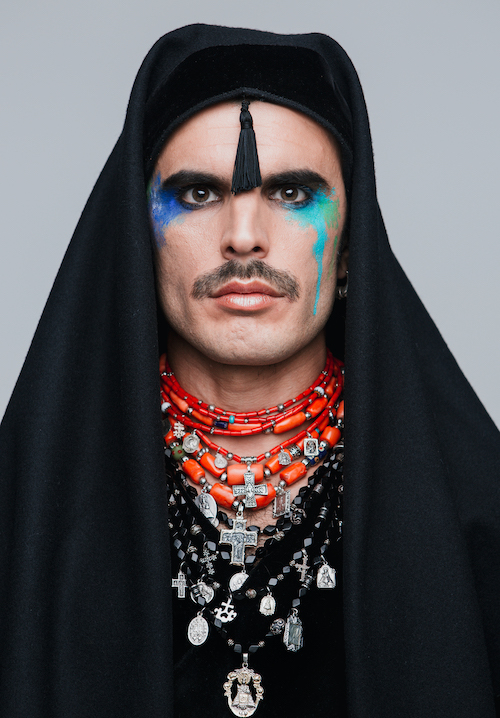 Photo & Main Image: Lacosta Studio
Photo & Main Image: Lacosta Studio
Your shows are great because there is always such a cross-section of demographics.
Thank you. I always have the same attitude onstage, regardless of the age, gender, sexuality of the audience that night and I think that is my secret weapon. I am so proud about the mixture of people that come to my shows. I have Grandmas coming to my shows with their grandaughters who maybe bring their LGBT friends along, or their non-LGBT friends! Then there are people who are more interested specifically in electronic music or perhaps folkloric music. I think it’s marvellous when I see this mix in the public. Different people coming together.
One of my fights – I say one, because I have many – but one very important one is to push against social media. I think social media makes us compartmentalise and divide ourselves. We have to push back, push in the other direction because that is the only thing that can save us.
One of the things I love about Britain is its multiculturalism. Spain feels less multicultural in comparison but perhaps it has a stronger sense of its own identity because of that.
Yes, I think opening your culture up to others and creating a multicultural country is great. But I also think we have to appreciate our own culture, our languages, our way of life because that is a part of this idea of multiculturality. I think it is a libertad profunda, a deep freedom. We have to have a real love for our own culture at the same time – this is true multiculturalism. The other way is aculturalism – the exclusion of culture.
Your show at Barcelona’s Palau De La Musica was such an emotional night for me. The first concert since the pandemic began, so many queer people in one room and then watching you perform in this stunning venue. I had tears in my eyes several times.
It was an emotional concert for me too. The Palau is an incredible venue. Also when I was nineteen I lived in Barcelona for three years and busked on the street, which at the time was illegal. I remember the police were constantly on us, trying to confiscate our instruments. So to now come back to Barcelona and perform two sold-out shows was very emotional for me.
Being able to tour at this time and travel the country must be great.
Yes, I have been very fortunate because people have been calling me, asking me to come and play because there are not as many artists performing right now. It’s been a very special time for me. We debuted the tour in June 2019 and will continue until Spring 2022. Although we paused a bit during the height of the pandemic the tour will have been over two and a half years.
Are you working on new music at the same time?
I will take a six month break after the tour ends and work on a new album then. I want to radicalise regional, local music by mixing it with non-regional, non-local production. I want to push the contrast as far as possible in both directions. The most regional music with the most modern production. I think this mixture will be so good.
Your last album was Manual de Cortejo. What was the concept when you began work on it?
First of all I was trying to compile music in the format of a cancionero, a traditional collection of folkloric music. I wanted to select songs that spanned a whole year, starting with a song about Christmas, then Carnival, then summer – songs about work, about the cycle of the year. This felt a natural way to classify music. But then when I was in the recording studio, it felt such a strict way to create the album. I realised that all the old songs were so important to everyone. These songs were a way for people to flirt with each other. Then one day I realised I already have a Manual de Cortejo, I don’t need to create a classical compilation. These songs that I had could be used at any time of your life, even for fucking!
Haha…It’s interesting because I think most of Britain’s traditional music is religious, it’s hymns. Although there are limericks too.
Yes, I think the more famous folkloric music that you hear is religious, but the real folkloric music, the music you hear in the kitchens, it’s not religious. It’s funny and superficial.
At one point during your show, you and your band came together, improvised and ad-libbed poetry on the spot.
Yes, I think this is where traditional poetry really gets its power from – spontaneity and always with a little acid, a snarky remark. Not everything is pure and white, there is also darkness.
One of the songs on Manual de Cortejo and one that was emotional at your concert was ‘Rambalín’ about the homophobic killing of Alberto Alonso Blanco in 1976. Here we are in 2021 with the recent homophobic killing of Samuel Luiz. Do you feel things have progressed since 1976?
It’s so clear that in history we have been murdered, we are murdered and we will continue to be murdered for being homosexual, for being trans, for being women, for being different in any way. The only thing we can continue to do is to not stay silent. It’s incuestionable, unquestionable, we have to speak up because it costs us nothing! It’s our responsibility. When an injustice happens in front of our eyes, not staying silent is the least we can do. If you don’t act, then you are in favour of injustice.
We also need to quickly discuss el cuerpón! How do you stay in shape?
Thank you. Haha. I live in the countryside and corto leña – I chop wood for the fire in winter. I have two donkeys, Xuana D’Arcu (Joan of Arc) and Faraona (Pharoah), and I have to cut enough grass for them in summer to store it during the winter. I have a farm too where I grow vegetables. That is my cross-fit! Haha.
Lastly we are named after the biggest-selling single of 2001, so we always ask what is your favourite Mariah Carey song?
Oof, I think I only know one – the Christmas one. I don’t know any others! Haha.
Haha…then as a bonus question who is your favourite folklorica?
It has to be Lola Flores. I really like the song ‘Tanguillos de la abuelita.’ The video clip is her in a bus, full of people and she is conjurando, putting spells on people!
Rodrigo Cuevas
Website / Instagram / Facebook / YouTube / Spotify



